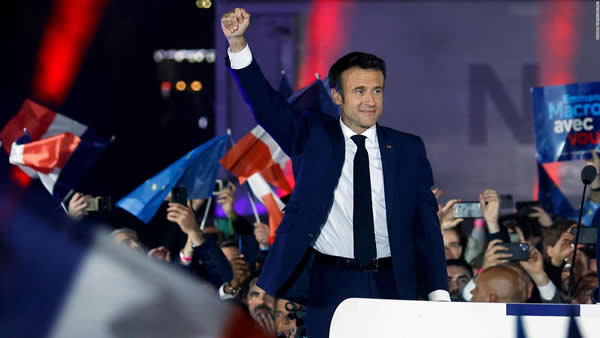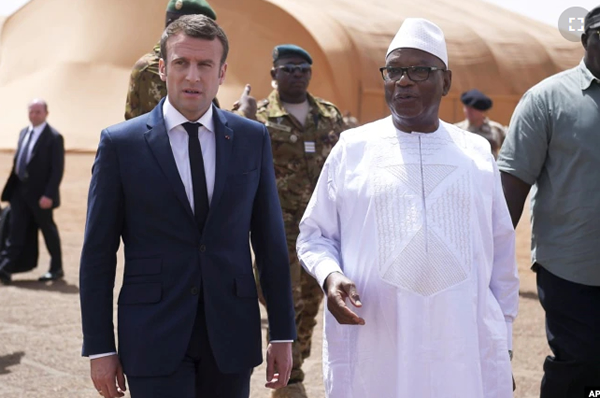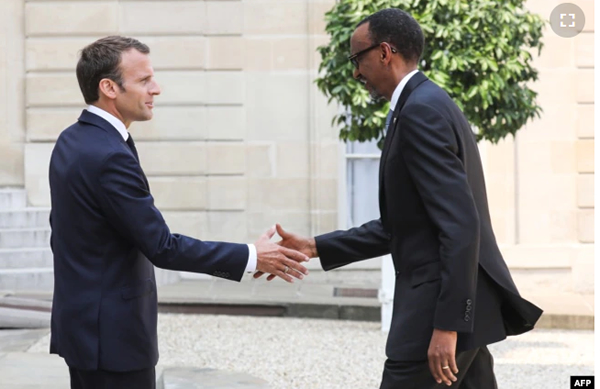
Five years ago, France’s Emmanuel Macron saw big when it came to Africa. Days after his presidential inauguration, he flew to northeastern Mali, meeting with French troops and vowing, alongside his Malian counterpart, Ibrahim Boubacar Keïta, to wage an “uncompromising fight” against Islamist terrorism.
A few months later in another Sahel country, nearby Burkina Faso, he laid another pillar of his Africa strategy based on a “rupture” of traditional French-Africa relations. France’s 39-year-old leader told students from the University of Ouagadougou he was “from a generation that doesn’t come to tell Africans what to do.”
Today, the Sahel insurgency is expanding southward, and both Mali and Burkina Faso are under military rule. France’s counter-insurgency military operation in the Sahel is downsizing, regrouping and recasting itself under a European umbrella.
Meanwhile, Macron’s ambitious promise of transforming France’s relationship with Africa is still in the works.

“The goal should be to accompany local efforts rather than expanding French interests in Africa,” Cameroonian intellectual Achille Mbembe told French broadcaster RFI. If that happens, he added, “It would be possible to finally get out of France-Afrique,” describing Paris’ old and tangled ties with its former colonies.
Yet, as Macron officially begins his second term this Saturday, Africa appears to be taking a back seat to other, more immediate priorities, both domestic and European, as the war in Ukraine takes center stage.
French-African relations barely figured into an election campaign that saw him facing off anti-immigration, far-right leader Marine Le Pen in the runoff.
“It would be hard to see Macron completely changing his African strategy” in his second term, Africa analyst Antoine Glaser told France 24 TV in a recent interview. “I think what will change will be the method … he will be a lot less on the front lines,” giving African and European partners a bigger spotlight.
Other analysts agree France should be more attentive to African concerns, mindful it now competes against many other foreign players on the continent, including in former French colonies.
“France and Europe fail to properly listen to the priorities of different African states,” said Africa-Europe researcher Cecilia Vidotto Labastie, from the Paris-based Montaigne Institute research institution. “This creates space for other partners — or competitors or enemies — to act.”
Breaking with the past
Still in his first term Macron did listen and respond to several key African priorities, recognizing more painful aspects of France’s legacy on the continent — and in doing so, going further than his predecessors.
He acknowledged his country’s role in Rwanda’s genocide and crimes committed by French soldiers and police during Algeria’s war of independence — although he ruled out an official apology to France’s former colony. In both cases, Paris set up expert commissions to dig into historical archives.
Those steps, among others, helped cement ties between Macron and Rwandan President Paul Kagame, following years of rocky French-Rwandan relations.

Ties with Algeria remain strained, however, including over other, more recent issues, like French visas and Macron’s remarks about Algeria’s post-colonial rule. Nonetheless, Algerian President Abdelmadjid Tebboune congratulated his French counterpart on his reelection last month and invited him to visit.
Macron also became France’s first leader to restore looted colonial-era treasures — returning a dozen artifacts to Benin and a sword to Senegal. Those gestures helped to unleash a broader restitution debate and similar moves elsewhere in Europe.
“The fact he has so much energy and interest in this, in a way it obliged other countries to do the same,” said analyst Vidotto Labastie. “This is something that is new. In a way, it’s now part of Europe-Africa relations.”
Less successful has been Macron’s support for efforts to reform the West and Central African CFA currency, and for a France-Africa summit that featured civil society rather than the continent’s leaders last October.
Aimed to “reinvent” France’s relationship with the continent, the summit in Montpellier, France, also offered a forum for young Africans to air grievances against Paris’ alleged tolerance of corruption and dictators in Africa.
“Emmanuel Macron wanted to shake up French-Africa relations,” one participant, Ivorian historian Arthur Banga told Jeune Afrique news magazine, but still described changes the president has realized to date as largely in form, rather than substance. Over Macron’s next term, Banga said, “The first steps he initiated over five years must now deliver results.”
Sahel setbacks and moving forward
Macron’s biggest challenge and setback, analysts say, has been in the Sahel.
The civilian presidents he met with five years ago in Mali and Burkina Faso have been ousted and replaced by military juntas. The Islamist insurgency that French and African troops hoped to conquer has spread. Russia-based Wagner mercenaries are implanted in Mali, and anti-French sentiment is mounting in some countries.
Last month, Mali’s military rulers suspended French broadcasters France 24 and RFI, over their reports of alleged rights abuses by Malian forces. Last week, as the two countries traded accusations over hundreds of bodies found buried in the Malian desert, Mali announced it had terminated a nearly decade-old military cooperation agreement with France — even as French troops were already leaving the country, as part of a full withdrawal planned over several months.
Macron’s strategy in the Sahel was a failure, France’s Le Monde newspaper wrote, its fallout “casting a sandy veil over his record.”
Not everyone agrees.
Montaigne Institute’s Vidotto Labastie believes Macron’s Sahel setbacks were partly due to a mix of factors beyond his control — including the death of Chadian leader Idriss Deby, whose country was a linchpin of the regional counterinsurgency fight. They should also be seen within a wider European Union context, she adds.
“It depends on how you define failure; France was never alone,” she said, noting Denmark’s announcement in January it would withdraw its forces from Mali and West Africa. “Was it a failure for Denmark? For the EU?”
Moving forward, Vidotto Labastie said, France and Europe need to be more attentive to Africa’s demands in sectors like energy and migration.
“The more France and the EU lack clarity in the region, the more space there is for Russia and also Turkey” along with other foreign powers, she said. “They will be ready to exploit any difficulty of the Sahel strategy and French action.”
Analyst Glaser agrees France’s Africa strategy needs to be attuned to a more competitive and opportunistic reality.
“France was in a dominant position for 30 years, until the fall of the Berlin wall,” he said. “Now it’s a globalized Africa … the world is changing, and Africa is changing even faster.”























